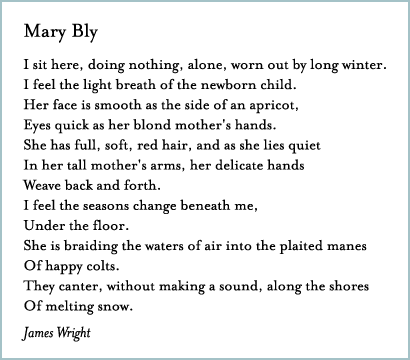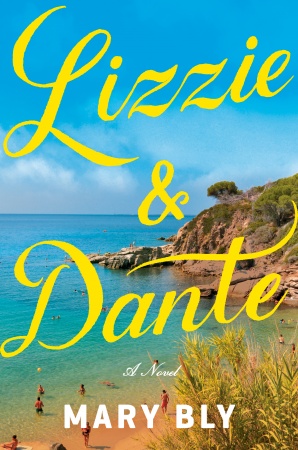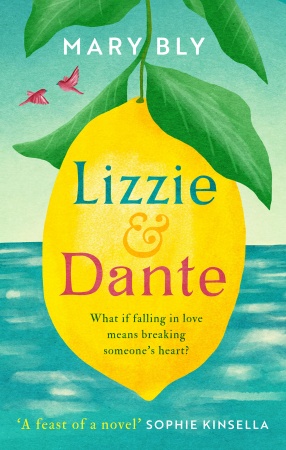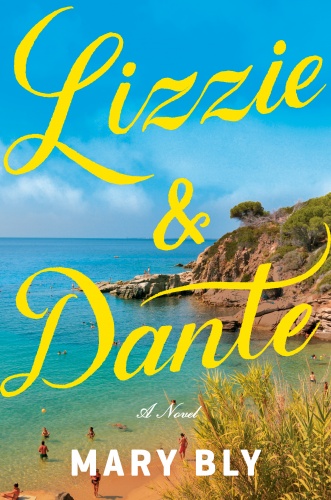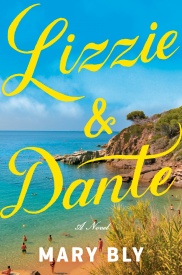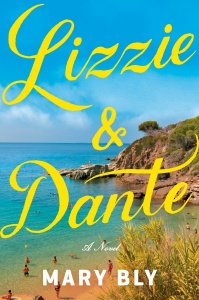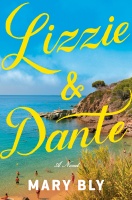Lizzie & Dante
The insightful, audacious, and deeply romantic story of a woman whose life turns upside down after she meets an enigmatic chef on vacation in Italy.
Find Lizzie & Dante on:
• StarTribune’s hot summer reading list
• New York Times New & Noteworthy List
Bonus Goodies:
• Read a beautiful poem written for Mary by Pulitzer Prize
Winning Poet and Mary Bly’s Godfather, James Wright
• Watch the Lizzie & Dante teaser trailers (part one) (part two) (part three)
• Good News! Lizzie & Dante has a Book Club Kit
Lizzie & Dante
A novel written by Mary Bly, Eloisa James’ other self.
The insightful, audacious, and deeply romantic story of a woman whose life turns upside down after she meets an enigmatic chef on vacation in Italy.
On the heels of a difficult break-up and a devastating diagnosis, Shakespearian scholar Lizzie Delford decides to take one last lavish vacation on Elba, the sun-kissed island off the Italian coast, with her best friend and his movie-star boyfriend. Once settled into a luxurious seaside resort, Lizzie has to make big decisions about her future, and she needs the one thing she may be running out of: time.
She leaves the yacht-owners and celebrities behind and sneaks off to the public beach, where she meets a sardonic chef named Dante, his battered dog Lily, and his wry daughter Etta, a twelve-year-old desperate for a mother. While Dante shows Lizzie the island’s secrets, and Etta dazzles with her irreverent humor, Lizzie is confronted with a dilemma. Is it right to fall in love if time is short? Is it better to find a mother briefly, or to have no mother at all? And the most difficult question of all: What if falling in love inevitably leads to broken hearts?
A transporting, all-consuming story about love, courage, and Italian wine, Lizzie & Dante demands to know how far we should travel to find a future worth fighting for.
~ Read an Excerpt ~
Order Your Copy ↓
Lizzie & Dante
is available in the following formats:
Digital:
Audio:
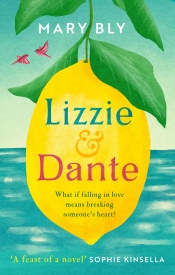
United Kingdom:
~ Read an Excerpt ~
Reviews of Lizzie & Dante
“ …a delicious rom-com… with yachts, secret ocean coves, and mouthwatering accounts of a crabby chef’s set menu that’ll have you ready to plan a trip to Elba. ”
- Conde Nast Traveler
“ …an insightful and hope-filled love story as bighearted as it is heart-rending. A powerful story about choosing to live and the courage it takes to do so, dying or not, and the extravagance of a life well-lived, Lizzie & Dante is without a doubt the best book of summer 2021. ”
- Book Reporter
“ …a beautiful read and one that definitely calls for a box of tissues nearby. ”
- That's Life!
“ A moving modern-day love story laced with poetry… ”
- Star Tribune
“ Bly renders her characters in pliant and incisive prose; the sex scenes are sexy and the portrait of a woman embarking on the romance of her life while running on borrowed time feels authentic and poignantly drawn, and never mawkish…Bly handles a delicate subject with aplomb. ”
- Publishers Weekly
“ Bly, known best for the best-selling historical romances she writes as Eloisa James, deftly pivots to contemporary fiction with an emotional roller coaster of a novel that candidly explores such complicated subjects as sex and desire, love and loss, and family and friendship. Whether toothsomely describing Italian dishes, celebrating the natural beauty of Elba, or performing some literary dissection of Romeo and Juliet, Bly writes with a Prosecco-fizzy wit that is simply irresistible, but what will equally resonate with readers is her richly nuanced characters and their embrace of life in all its glorious messiness. ”
- Booklist, Starred Review
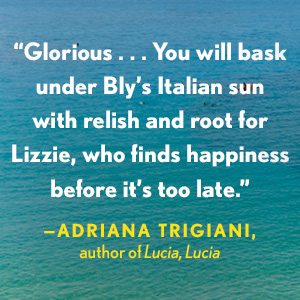
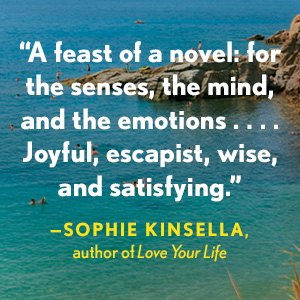
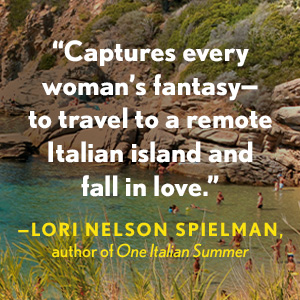
Lizzie & Dante
Excerpt
Jump to Ordering Options
Lizzie took a last slice of bread and wandered down to the public beach, not the hotel’s exclusive patch of sand. The path to the beach was built from weathered boards and lined with lazily commercial stores full of shells painted to look like ferrets, and handbags woven out of seagrass. They weren’t doing much business.
She rented an umbrella that came with a flat sunbed and a chair, which she folded up to give her bed more room. She had neighbors, but they carefully circled around her patch when going to swim. Italians were very polite.
Dogs? Not so much.
The dog that trotted over to greet her had the kind of hair that bristles in some places and lies down in others. She was scruffy and ugly and very fond of licking.
She could have been homeless, a wandering dog, given the way she gave so many kisses and wagged her small bony behind. She put on a good display of ecstasy after being given a bite of Lizzie’s jam toast.
“But homeless dogs,” Lizzie said to her severely, “don’t wear velvet collars with the name Lulu embroidered on them.”
Lulu flopped down and rolled over, showing a scruffy stomach with sagging nipples that had seen better days.
“I’m not a dog person,” Lizzie told her.
Lulu was too busy wagging her tail in the sand to be insulted. Lizzie ended up scratching the dog’s belly, because it seemed the polite thing to do. Later, when the sun moved, Lizzie dragged her bed around to stay under the umbrella. Lulu wanted to be in the shade too, so she crowded Lizzie over, and they went to sleep.
Like that. With Lulu’s back against Lizzie’s stomach, the way that lovers sleep in films. Except that Lulu was moonlighting and presumably belonged to someone else’s umbrella, and Lizzie didn’t do lovers anymore.
Lulu snored, which was par for the course. Lizzie’s previous lovers had always snored. She knew because she couldn’t sleep with someone in her bed, so during those years when she had entertained men, she generally didn’t sleep much. Or at all.
A hangover from foster care.
Not that Lizzie had had an unpleasant experience in foster care, because she hadn’t. She was one of the lucky ones, whose various foster mothers had cared about the job. But she had learned quickly that one’s bed was never really one’s own, because at any moment a fraught social worker might drive up in a battered car with three kids in it who’d end up in “your” bed, while you moved to the couch.
It was so obvious that Lulu wasn’t someone to worry about that even Lizzie’s absurd subconscious finally accepted it.
An hour after she fell asleep, she woke up with the panicky feeling that she had gotten behind on her meds. Could she have? No. Sometimes just remembering that she had taken the pills helped. Before her nap, she had washed one down with sparkling water.
There was a man sitting between her umbrella and the sea, where the children usually played, reading. Lizzie sat up, spilling Lulu onto the ground.
“Excuse me,” she said, not quietly. “That’s my book.”
“That’s my dog,” he said, looking up. He was as scruffy as Lulu, and his nose had a distinct bend, as if he’d been in a fight. Dark hair tousled in a sandy, windy way. Facial hair. It was short, but still a beard.
Lulu was licking his ear, so she guessed he had a point.
“Romeo and Juliet, huh?”
Lizzie always woke up irritable, even more so since she was on so many meds. Sleep dragged at her cheekbones and made it impossible to smile. “Yeah,” she said flatly. Now he would either reel off a verse or two, or confess that he never understood the Bard. Or that his fourth grade teacher saved his life.
He quoted from Macbeth.
At least it wasn’t tomorrow and tomorrow and the whole petty pace thing. Now that she didn’t have many tomorrows left, she’d lost all patience for Macbeth’s whining response to his wife’s suicide.
“Live you?” he asked, with a grin. “Or are you aught that man may question?”
“Questions are out,” she said, pulling her sunglasses back down over her eyes. “Do I look like a witch to you?” Stupid question. “Don’t answer that,” she added. “Are you sitting on my hat?”
“No.” He stopped staring at her and looked around. “Is it a pointy black hat? Didn’t the Macbeth witches wear wild clothing?”
Lizzie was wearing her favorite new bikini: white eyelet embroidered with yellow flowers and crochet trim. The Queen of England might consider it wild, but no one else. He must be trying to pick her up. He must be desperate.
She got herself to her feet. So what if she’d paid twenty euros for the umbrella? She could give it up for the pleasure of getting herself away from the amateur Shakespearean reading her book.
She gave him a smile, one without any joy. “I’m so sorry, but I’m going to my hotel now. May I have the play back?”
“Where are you staying?”
Oh, great. This was like those stories about countries where you were pestered to go stay in somebody’s cousin’s hotel, and the only way they could identify you later was by your fillings. “I’m not interested in meeting an Italian man, and I don’t need a recommendation for a hotel,” she told him.
“I live in America most of the year,” he said.
“America is a big place.”
“Do you live in New York?”
“Absolutely not.” It was a lie.
Lulu pranced up to her, an orange straw hat in her mouth. “Bad dog,” Lizzie said, but she couldn’t help laughing. Lulu wagged her tail and danced backwards.
Lizzie dropped to her knees, holding out her hand. “Please give me my hat.”
He intervened. “Lulu.”
Lulu looked at him sideways and shook the hat.
“Lulu.”
She pranced over to Lizzie and dropped it at her feet.
“Sweet dog,” Lizzie said, rubbing her ears. “You’re a good dog, aren’t you?”
“Do you ever—”
Lizzie had found that honesty could be devastatingly effective. “Please,” she said, standing up again and letting the smile fall off her face. “I want to be alone.”
He stood up and handed over the play, and didn’t even look sulky, which was a miracle. Or perhaps it meant that he shambled around the beach all the time, getting turned down. He had to be in his 40s, after all. He had nice muscular legs, but he was no youngster, like the Italians strutting up and down in their miniature Speedos.
“You should go to Fabrizio’s for lunch,” he said. “It’s the pink one, down that way. Just tell me one thing. Why are you reading Romeo? Isn’t that high school fare?”
“And college. I teach Shakespeare in a university.”
“That’s even less of an answer. A busman’s honeymoon.”
“What?”
“Haven’t you read Dorothy Sayers’ mysteries?”
Lizzie shook her head. Violence was all very well couched in sixteenth century language, but otherwise—no. She didn’t go anywhere near Grey’s novels, for example.
“A busman’s honeymoon is a phrase from the 1940s referring to a man who drives a bus for honeymooners, so he’s bored to death when it’s his turn. Why Romeo?”
Lizzie shrugged and tugged her hat over her eyes. “I guess I like the smell of petrol and the squawking of honeymooners.”
He nodded and snapped his fingers at Lulu. They wandered off down the beach as Lizzie watched to make sure that he went.
He had a nice ass. Worth watching. He didn’t look back.
Fabrizio’s was painted the faint pink color of the inside of a seashell. It was weather-beaten and old, and no one from a yacht would consider eating there. The dining room smelled like salt and tomato sauce, though the windows were open to sea air and screaming gulls.
A teenage waitress, sullen and pierced, served her a dish of polenta with wild mushroom sauce. It was crispy and savory, and came with a little pitcher of Elba wine, which looked milky white and bubbled slightly, like flat champagne.
. . .
The next day, Lizzie rented an umbrella sight of the seashore and the children’s jellyfish massacres. She paid for a month, and then pulled out Romeo.
If Rohan turned the play into a celebration of dudes, what would happen to the balcony scene? She got up to fold away the extra chair and tilt the umbrella just so. Reluctantly, she returned to the sunbed and opened the play again.
What was a Minnesota teenager like, anyway? As opposed to one from the Bronx?
She put the book down and adjusted her sunglasses. The two kids closest to her umbrella were building something with rocks and sand. Their mother was sprawled in a seat, talking on her cell phone. Her hair was streaked the color of…
The weathered seat of an outdoor toilet.
That Norwegian goat cheese that smelled terrible.
The cork top of her old desk.
Not bad. She was out of practice. She used to do metaphor trios all the time, back when life was long, and she was going to write a novel.
Not true.
She found it remarkably easy to be honest to other people, which probably explained why she didn’t have a special someone. That didn’t mean that she was honest with herself.
She had never really meant to write a novel. She had planned to write a book about her childhood. A memoir, brisker and funnier than Mommy Dearest, not that she’d ever read it.
Some book that would be. Around three pages, since she could scarcely remember her mother, and she had no harrowing stories from foster care. Her water bottle was baking in the sun, and it scattered sand all over her medicine bag when she picked it up.
She snapped the play open, skimmed scene two. One problem was that there wasn’t anyone evil in Romeo & Juliet, ready to take out Manhattan, a baddie like Voldemort. The three witches in Macbeth were theatrical gold, with the way they babbled about killing swine and tormenting sailors. Even when they awkwardly circled a pot, hand in hand.
How hokey was that? If only evil could always be visible. You could fight it then. You could do something about it. If only evil wore wild clothing, and spoke in rhymes.
The worst evil snuck up, like a nasty compliment. It didn’t announce itself the way Voldemort did, with shining signs filling the sky at night. You can’t pretend to be good when your face is pasted on the back of someone else’s body. Or if your only friend is a big snake.
Evil snuck into your blood at night, hiding, showing up under a microscope.
Of course, death was everywhere in Romeo and Juliet. The tomb was crammed with young dead people at the end. Death—
Lulu was on top of her, scrabbling up and licking her ear before Lizzie knew what was happening. Lizzie shoved her hard, and Lulu flopped backwards off the sunbed onto the sand, still wiggling, and had to be scooped back up in a burst of regret after Lizzie took a quick look around and confirmed that Lulu was on her own.
“I’m sorry,” she said, pulling Lulu’s furry body back up next to hers. “I didn’t know it was you. I didn’t mean to throw you off.”
Lulu lay down and panted. She was too hot, the poor dog. She should be at home, in one of those deeply shadowed Italian houses, built with walls so thick that heat never intruded. That man should be giving a damn about her.
“If you were mine, we’d be in the air conditioning right now,” Lizzie told her.
Lulu panted some more, and wagged her tail. It wasn’t much of a tail. Some of the hair on one side was missing. Lizzie picked it up for a closer look. “What happened to you, Lucy-Lu?” she asked. “It looks as if a rabid cat munched on you for breakfast.” That wasn’t a very good one. “Like a child came along and stripped your bark like a beech tree.” The jellyfish killers must be getting to her. “Like…”
Of course, children were cruel. Her foster mothers had been nice, but the kids at school always knew. She would have had to relive middle school in order to write a memoir.
Embrace the suck, cancer patients say to each other. The upside of a her diagnosis? Not thinking about 8th grade, ever again.
They managed to stay relatively cool for another hour. When Lulu panted hard, Lizzie poured water over her head. She put Shakespeare to the side and started reading a book about Georgian courtesans.
“I would have made a terrible courtesan,” she told Lulu a while later. Lulu opened one eye. “I am very hard-headed when it comes to money, and these women seem to live for the moment. Plus…all those penises.”
Lulu looked bored.
So far the book hadn’t answered the questions she’d wanted to ask. One had to suppose that a courtesan didn’t have the right to get a headache, as it were. But her period? What about that? Maybe men back in the 1800s were less squeamish than they are now.
She adjusted her hat so that it cast an orange glow over the pages and spared a moment for her first boyfriend Jake, who’d been fussy when it came to bodily fluids. Sweet, but fussy.
She was still thinking about Jake, and whether it would be fair to blame her imperfect relationships on him (answer: no), when a shadow fell over her legs.
Lulu’s owner brought a towel this time and threw himself down at Lizzie’s feet as if they were old friends. Lulu went into transports of ecstasy, leaping off the sunbed, wagging her whole body.
“Ciao,” he said, twisting away from Lulu’s mouthy kisses enough to speak.
He was looking at her and smiling, so Lizzie said “Ciao” back. He was obviously not from the yachting contingent, which was a point in his favor. His hair was black with silver streaks, but his brows were still black. Most of the men in the hotel had hair that was resolutely dark, no matter their age.
“How’s Romeo coming along?”
“Boring as a busman’s honeymoon,” she confessed.
“Why are you reading it, then? I can lend you a Terry Pratchett.”
He liked satirical British fantasy? Another point in his favor.
“A friend of mine is directing a film version of Romeo. I’ve never read it with an actual performance in mind, let alone a movie.”
“Are they doing it in iambic pentameter?” He looked vaguely alarmed. “I failed that test.”
“Your professor made you accent a speech?” She only hammered on iambic pentameter if she disliked a class. Mostly, her students were lovable. Mostly.
“No, it was scuola media. Middle school to you.” He shivered. “Interrogatione, otherwise known as ritual humiliation. Stand up next to your desk and read Shakespeare in iambic pentameter until you miss an accented syllable. We’d all been taking English for years, but no one could understand a word we were reading.”
“Sounds tough.”
“When you messed up, Mr. Baldini would hoot with laughter and make everyone clap for the dunce.”
“Brutal,” Lizzie said, impressed. “My students think that I’m being mean if I call on them.”
“Americans like to complain. I have a restaurant, so I see it all the time.”
“Aren’t they allowed to offer an opinion about your cooking?” Lizzie asked, feeling defensive. It was sometimes hard to defend her countrymen, but she always did it, even if she had to fib.
“They think I’m mean because I won’t give them exactly what they want.”
“French fries? Hamburgers? What kind of food—” She broke off because that was a stupid question.
“Italian,” he said, not taking offense. “We love French fries; we just shape them differently. But I serve one dish every night with no substitutions.”
Lizzie thought that over. “What about vegetarians?”
“I do vegetarians, nut allergies, and gluten. But I won’t do vegans, and I won’t make French fries on command.”
She thought about pointing out that his restaurant would never thrive under those circs, but he likely didn’t care.
He was flat on the sand now, only his head under the shade of the umbrella. He was wearing long swimming trunks covered with poppies. Lulu jumped back up onto the sunbed. He had his eyes closed, so Lizzie examined his body under the shade of her sunhat. It was a beautiful brown color. For someone who had a beard—albeit clipped short—he wasn’t very hairy.
“My name is Lizzie,” she said, after a while.
“You’re going to love this, English professor,” he said, sounding drowsy. “Dante.”
end of excerpt
Order Your Copy →
A Poem written for Eloisa:
Eloisa’s godfather was the poet James Wright, winner of the Pulitzer Prize for his Collected Poems. Among those poems – and one of Wright’s most beloved – is a poem written for his goddaughter, Mary Bly (aka Eloisa James).
